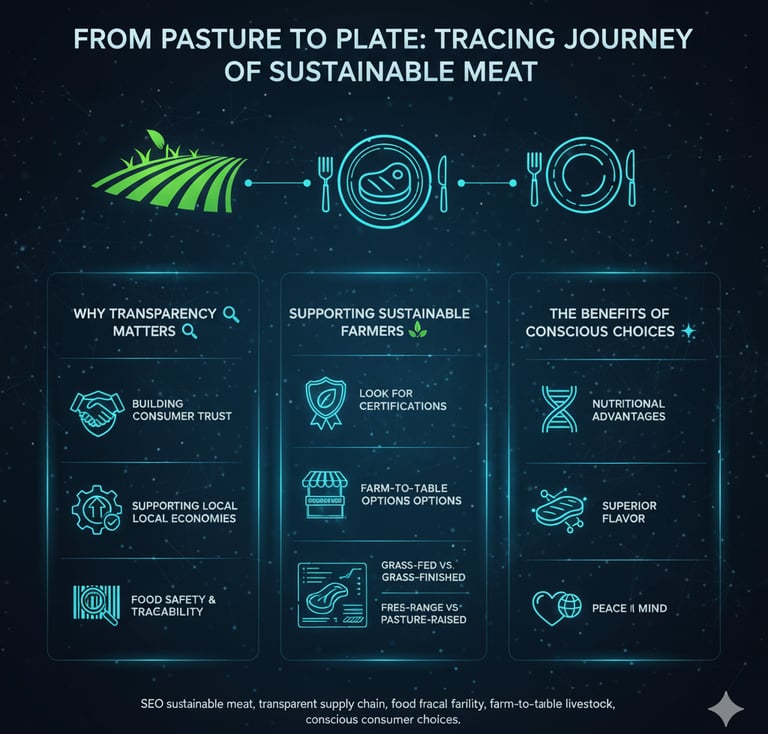From Pasture to Plate: Tracing the Journey of Sustainable Meat
Have you ever looked at a cut of meat in the grocery store and wondered about its story? Where did it come from? How was the animal raised? What impact did its journey have on the environment? In today's complex food system, these questions are more relevant than ever. There's a growing movement towards understanding the complete path from pasture to plate, emphasizing sustainable meat production and a transparent supply chain. For conscious consumers, knowing where your food comes from isn't just a preference; it's a priority. Let's explore why transparency matters and how you can support farmers dedicated to producing high-quality, ethically raised meat. The Power of Knowing: Why Transparency Matters The industrialization of our food system has, in many ways, distanced us from the origins of our meals. This distance can breed uncertainty regarding animal welfare, environmental impact, and even the nutritional quality of what we eat. A transparent supply chain in the meat industry addresses these concerns head-on. Building Consumer Trust: When farmers are open about their practices, from how animals are fed and housed to processing methods, it fosters immense consumer trust. This trust is invaluable in an age where food scandals and ethical debates are common. Ensuring Ethical Practices: Transparency allows consumers to verify that the meat they purchase aligns with their values concerning animal welfare and environmental stewardship. It holds producers accountable. Supporting Local Economies: A transparent supply chain often highlights local meat sourcing, which directly benefits regional farmers and keeps money within the community. Food Safety and Traceability: In the event of a food safety concern, a fully transparent system ensures food traceability, allowing for quick identification of the source and minimizing widespread issues. Identifying and Supporting Sustainable Farmers So, how can you, as a consumer, navigate the market and find meat that meets your ethical and sustainable criteria? Look for Certifications: Third-party certifications are excellent indicators of specific standards. Labels like "Certified Humane," "Animal Welfare Approved," "Organic," or "Grass-fed Certified" verify that certain practices were followed. Always research what these certifications truly mean. Seek Out "Farm-to-Table" Options: The farm-to-table livestock movement is all about direct connections. Farmers' Markets: Your local farmers' market is an ideal place to meet farmers face-to-face. Ask questions about their farming methods, feed, and animal care. This direct interaction is the epitome of transparency. Community Supported Agriculture (CSA): Join a meat CSA, where you purchase a share directly from a farmer and receive regular deliveries of their products. This builds a direct relationship and often provides opportunities for farm visits. Local Butchers: Develop a relationship with a local butcher who sources from nearby sustainable farms. They often have deep knowledge of their suppliers and can provide details about the meat's origin. Understand Labels (and Misleading Terms): Be an educated shopper. "Grass-fed" vs. "Grass-finished": True grass-fed benefits come from animals that have consumed only grass and forage their entire lives (grass-finished). Some "grass-fed" claims might mean the animals ate grass for part of their lives but were finished on grain. "Free-range" vs. "Pasture-raised": While "free-range" implies outdoor access, "pasture-raised" generally indicates more extensive time spent on pasture with foraging opportunities, especially for poultry. "No Added Hormones" / "Antibiotic-Free": These are good, but combine them with other certifications for a fuller picture of animal welfare and sustainability. Visit the Farm (if possible): Many sustainable farms offer tours or open house events. Seeing the animals and the environment firsthand is the ultimate form of transparency and a fantastic way to connect with your food source. The Benefits of Conscious Choices Choosing sustainable meat production isn't just good for the animals and the planet; it's also often beneficial for your health and palate. Nutritional Advantages: Grass-fed benefits are well-documented, including higher levels of Omega-3 fatty acids, conjugated linoleic acid (CLA), and various vitamins and antioxidants compared to grain-fed alternatives. Superior Flavor: Many argue that ethically raised animals, especially those with diverse diets and opportunities to move, produce meat with a richer, more nuanced flavor profile. Peace of Mind: Knowing that your food comes from a farm that prioritizes animal welfare and environmental health brings a sense of satisfaction and confidence to your plate. Conclusion: Your Plate, Your Power The journey from pasture to plate is a complex one, but with increasing transparency and consumer awareness, it's becoming easier to make informed choices. By seeking out sustainable meat production and engaging with a transparent supply chain, you're not just buying food; you're investing in ethical practices, supporting local communities, and promoting a healthier planet. Every conscious choice you make at the grocery store or farmers' market helps shape the future of our food system, proving that truly, your plate has power.
Mr.Diyan Ahmed
9/24/2025


Connect
Partnering for innovation across industries.
Explore
Discover
+923001534092
© 2025. All rights reserved.
